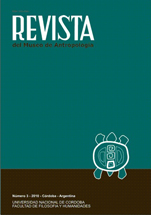Some thoughts on the implications of memory and identity in the constitution of the patrimony
DOI:
https://doi.org/10.31048/1852.4826.v3.n1.5456Keywords:
memory, identity, patrimony, museum, anthropologyAbstract
This paper is about the relation between the concepts of Memory – Identity – Patrimony from an anthropological focus. Since the intrinsic ambiguity of those concepts, it´s considered the preponderant role play by the mechanism of memory/oblivion-individual identities/collective identity in the choose of what it will be considered patrimony inside a community. The concept of patrimony have not been the same along the history and its changing meaning have evolve since the idea of an illustrated treasure to the idea of a touristic resource, and rating it as a cultural product and a mechanism of identity construction. The museum is one of the institution in charge of determine and perpetuate what is consider patrimony and what is not. This could represent the past, in a reliable way or not, it could distort it from its selections and classifications, it could restrict the past because of its codes of historic representation, the way in which it tell it story, the way in which the artifacts are presented. The artifacts are gathered and presented to generate a particular sense to the visitor that observes it.Downloads
References
Augé, M. 1998. Las formas del olvido. Gedisa. Barcelona.
Bourdieu, P.1984. Distinction: A Social Critique of the Judgement of Taste. Cambridge, Harvard University Press.
Boylan, P. 1996 Cincuenta años del ICOM. Museum International 191 (XLVIII,3):47-50.
Candau, J. 2002. Antropología de la Memoria. Nueva Visión. Bs.As
Delfino, D .y P. Rodríguez. 1992. Los Museos de Arqueología. Ausencia del Presente en las representaciones del Pasado. http://www.naya.org.ar/articulos/museologia04.htm. (Última consulta:12/04/2010).
Fernández de Paz, E. 2006. De tesoro ilustrado a recurso turístico: el cambiante significado del patrimonio cultural. Pasos. Revista de Turismo y Patrimonio Cultural 4(1):1-12. http//www.passonline.org. (Última consulta: 14/07/06).
Garcés, E. 2004. Patrimonio, políticas de la memoria e institucionalización de la cultura. ICONOS Nº 20:26-34.
Greenberg, R., B. W. Ferguson and S. Nairne (eds). 1996. Thinking about exhibitions. London, Routledge.
Hall, S. 1995. A Questão da identidade cultural. Textos Didáticos Nº 18:59-72.
Iniesta, M. 1994 Els gabinets del món. Antropologia, museus i museologies. Pagès editors, Lleida. Instituto Colombiano de Cultura. 1980. Museología y patrimonio cultural; críticas y perspectivas. Bogotá.
Le Goff, J. 1991. El orden de la memoria. El tiempo como imaginario. Paidós. Buenos Aires.
Pereiro, X. 2004. Apuntes de Antropología y Memoria. Revista O Fiadeiro Nº 15: 123-158.
Shanks, M y C, Tilley. 1997. Re-Constructing Archaeology. Cambridge University Press. Cambridge.
Downloads
Published
Issue
Section
License
Those authors who have publications with this Journalaccept the following terms:
a. Authors will retain their copyrights and guarantee the journal the right of first publication of their work, which will be simultaneously subject to the Creative Commons Attribution License (Licencia de reconocimiento de Creative Commons) that allows third parties to share the work as long as its author and his first publication in this journal.
b. Authors may adopt other non-exclusive licensing agreements for the distribution of the version of the published work (eg, deposit it in an institutional electronic file or publish it in a monographic volume) provided that the initial publication in this journal is indicated.
c. Authors are allowed and recommended to disseminate their work on the Internet (eg in institutional telematic archives or on their website) before and during the submission process, which can lead to interesting exchanges and increase citations of the published work. (See The Effect of Open Access - El efecto del acceso abierto)












